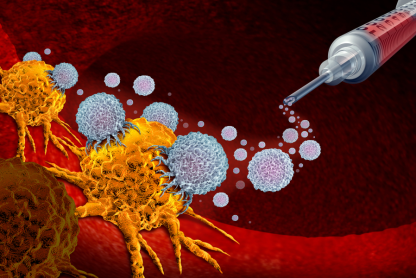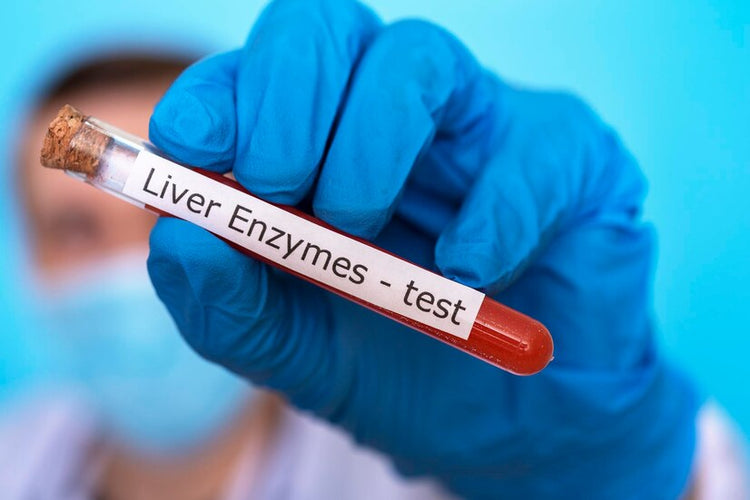Can Immunotherapy Cure Stage 4 Cancer?

Related products
The most advanced stage of cancer is called stage 4, or metastatic cancer, in which the cancer cells have moved from the original tumour to other areas of the body via the lymphatic or circulatory systems. Although it is usually thought to be incurable, therapies are meant to control symptoms and prolong life.
The most advanced stage of common malignancies, such as colon, lung, prostate, and breast cancer, is stage 4. Treatment is complex at this stage because the disease has progressed from its initial location to far-flung body areas, such as the brain, liver, lungs, or bones.
Immunotherapy – What Is It?
Immunotherapy is a novel therapeutic approach that utilises the body's immune system to target and eliminate malignant cells. Immunotherapy enhances the immune system's capacity to recognise and combat cancer cells more effectively, unlike traditional treatments such as chemotherapy and radiation, which directly target cancer cells.
Immunotherapy exists in several forms, each exhibiting distinct mechanisms of action. Checkpoint inhibitors, which interfere with proteins that suppress the immune system's response to cancer, are used in some immunotherapies. Monoclonal antibodies, synthetic variants of immune system proteins, sometimes target particular compounds inside cancer cells. Adoptive cell transfer therapy involves reinfusing a patient's immune cells into the body after modification to enhance cancer cells' recognition and destruction. Immunotherapy has shown remarkable efficacy in the treatment of several malignancies.

Immunotherapy For Stage 4 Cancer
When someone learns they have stage 4 cancer, everything might seem to fall apart. The prognosis might seem somewhat dire, and the standard therapies don't always provide much hope. It wouldn't be incorrect to describe immunotherapy as a game-changer for patients with advanced cancer since it may give much-needed hope for this fatal illness.
Immunotherapy may be compared to giving the body a boost against cancerous cells. It helps the immune system attack the disease more precisely, rather than making one feel ill, like standard therapies do. And you know what? Early indicators indicate that living well is just as important as surviving longer!
Immunotherapy reduces the unpleasant side effects that chemotherapy and radiation treatment may cause. Additionally, some individuals have effects that persist, enabling them to live their lives as they see fit.
Immunotherapy is like a ray of hope for those with stage 4 cancer, even if there are still obstacles to overcome. It serves as a reminder that hope never dies, even in the most trying circumstances.
How Immunotherapy Works For Stage 4 Cancer?
Immunotherapy assists the body in positively combating stage 4 cancer. One method involves halting cancer cells' checkpoints to escape the immune system. Immunotherapy allows the immune system to identify and attack cancer cells by inhibiting these checkpoints. It resembles providing the immune system with a boost, enabling it to locate and eradicate the cancer cells. Therefore, rather than fleeing, the immune system can identify and eliminate those cancer cells, greatly assisting individuals in combating stage 4 cancer.
What are the Different Types of Immunotherapies For Stage 4 Cancer?
Immunotherapy types include:
1. Adoptive T-cell Therapy
This therapy strengthens the immune system's capacity to eliminate malignant cells. Medical professionals take the immune cells and culture them in a lab. To eradicate malignant cells, healthcare professionals reintroduce the patient's cells into their body after they have developed. The two main types of T-cell transfer treatment include tumour-infiltrating lymphocyte therapy and CAR T-cell therapy. The immune system monitors proteins known as antigens on intruder cells' surfaces to remain vigilant against invaders, such as malignant cells. The immune system utilises T cells to identify and remove invaders.
How CAR T-cell therapy works
Receptors are proteins that are specific to T cells. Receptors operate in a manner akin to a computer's anti-virus program. The T cell security squad employs their receptors to identify and thwart invaders upon recognising their antigens. Furthermore, the T cells possess the capability to eliminate the invaders. Nevertheless, they have a defence of their own. They might conceal themselves from the T cells by adopting a different appearance. The CAR T-cell treatment ensures that disguised antigens do not deceive T cells.
Multiple myeloma, lymphoma, and various forms of leukaemia are among the blood malignancies that may be treated using CAR T-cell therapy. Medical professionals are researching CAR T-cell therapy as a potential treatment for brain and breast cancer.
How tumour-infiltrating lymphocytes (TIL) work
TILs function similarly to a small unit of troops reconnaissance in hostile areas. TIL cells may infiltrate or approach malignant tumours, but they are outnumbered and unable to effectively combat the cells. They cannot summon reinforcements because they cannot prevent malignant cells from delivering signals that weaken the immune system.
Healthcare professionals develop more significant and more potent TIL cells during TIL treatment. To encourage the growth of TIL cells, they extract tumour cells and provide drugs to them. The enhanced TIL cells may destroy malignant cells and interfere with signals inhibiting the immune system when reintroduced into the tumours.
2. Immune Checkpoint Inhibitors
Proteins called immunological checkpoints are found on immune cells and control immune responses to avoid autoimmunity and overactivation. Cancer cells may sometimes use these checkpoints to prevent immune system identification. By blocking these checkpoints, medications known as immune checkpoint inhibitors (ICIs) enable the immune system to efficiently identify and combat cancer cells.
3. Cytokine Therapy
Immune responses are controlled by signalling molecules called cytokines. By delivering specific cytokines, cytokine treatment increases the immune system's capacity to identify and eliminate cancer cells. Cytokines utilised in cancer immunotherapy include interleukins (such as IL-2 and IL-12) and interferons. By providing innovative methods to supplement conventional treatments like chemotherapy, radiation therapy, and surgery, these various forms of immunotherapy have entirely changed the way that cancer is treated. To enhance treatment results and address resistance mechanisms, combination strategies, including many forms of immunotherapy or immunotherapy in combination with other therapies, are also being investigated.
4. Cancer Vaccines
Cancer vaccines aim to boost the body's defences against cancerous cells. Cancer vaccines are designed to cure cancer that has already occurred or stop it from returning, in contrast to conventional immunisations that prevent infectious illnesses.
Various kinds of cancer vaccines exist, such as:
- Preventive vaccines, like the HPV vaccination for cervical cancer, are designed to stop certain cancers from developing.
- Therapeutic Vaccines combat cancer cells by focusing on specific tumour-associated antigens.
- Vaccines against cancer include the HPV vaccination for certain forms of cervical cancer and other malignancies and Sipuleucel-T for prostate cancer.
Immunotherapy for Stage 4 Lung Cancer Patients
For patients with stage 4 lung cancer who are not candidates for targeted therapy, immunotherapy has wholly changed the therapeutic landscape and significantly increased survival rates. It has evolved into a mainstay of conventional lung cancer therapy, mainly when used as a first-line measure. With so few other treatments, this innovative method gives people hope and promise. However, immunotherapy has been a major part of fighting advanced lung cancer because it allows the body's immune system to fight cancer cells. It is a very effective thing and gives better results on cases heretofore quite difficult.
Stage 4 Colon Cancer Immunotherapy
Immunotherapy is an alternative for stage 4 colon cancer in people who don’t respond to conventional treatments such as chemotherapy or surgery.
Immune checkpoint inhibitors help the body's immune system figure out and fight off cancer cells is one strategy. Medications, such as pembrolizumab, have been licensed for use in certain situations of metastatic colon cancer with certain hereditary characteristics.
Another study area involves personalised cancer vaccines that encourage the immune system to attack only cancer cells. But these vaccinations are still young and could help the body's defences attack colon cancer cells.
Immunotherapy is typically used with other therapies or after all other therapies have been tried but should be noted that it is only applicable to some. Because there are few clinical trial data to guide patients who are contemplating immunotherapy for stage 4 colon cancer, patients should discuss their situation thoroughly with their healthcare team to choose the best course of action.
What Lifestyle Changes are Needed to Ensure the Success of Stage 4 Cancer Treatment with Immunotherapy?
Lifestyle that leads to an optimal immune health augment the benefit of immunotherapy by creating environment that gives support to the best possible immune function. Here is a thorough examination of how different lifestyle choices might enhance immunotherapy:
a. Balanced Diet:
Forging a strong immune system calls for a diet that is full of all the necessary nutrients and is well balanced. Eating a nutrient dense variety of fruits, vegetables, whole grains, lean meats, healthy fats, and lots of variety gives the body the vital vitamins, minerals and the antioxidants and phytonutrients we all need.
All of us should minimize sugary snacks, processed meals, and too much red meat because they weaken the immune system and create inflammation.
b. Exercise
Regular physical exercise has shown such a great benefit to the immune system. Exercise rises immune cell formation, reduces inflammation and enhances circulation.
Moderate intensity cardiovascular activities like cycling, swimming, running or walking all increase immune function.
c. Stress regulation
Long term stress could reduce immunity and make the body less able to respond to immunotherapies. Therefore, stress management is for the support of the immune function.
Progressive muscle relaxation, yoga, tai chi, deep breathing techniques and mindfulness meditation help reduce any stress or promote relaxation.
d. Sufficient Sleep
Sleep is necessary for the function of the immune system and overall well-being as well. Sleep is when the body heals and regenerates tissues, the immune system fights off illnesses and infections.
A regular sleeping schedule, a relaxing routine towards bedtime and a nice comfy sleeping place helps to get the body the 7 – 9 hours that it needs each night to repair itself and rebuild the immune system.
People receiving immunotherapy for stage 4 cancer provide a favourable environment for their immune system to operate at its best by implementing these lifestyle modifications. Before making significant changes to one's diet, exercise routine, or other lifestyle choices, it is crucial to get advice from medical specialists, particularly for those receiving treatment for cancer or other specific medical issues.
People Also Ask
Does Stage 4 Cancer always mean that it is terminal?
No, stage 4 cancer is not always terminal. The stage often hints on the advanced state of the disease by indicating the spread of cancer to the local and distant organs. Some patients respond well to the received treatment and remission may be likely. However, the prognosis varies from patient to patient and by the type of cancer that has reached to this stage.
What are the side effects of immunotherapy?
Immunotherapy is a novel therapeutic approach that utilises the body's immune system to target and eliminate malignant cells. Common side effects of immunotherapy include flu-like symptoms, skin reactions, fatigue and digestive discomfort. More serious but less common side effects may include inflammation in the major organs such as liver, lungs and colon.
Conclusion
The most advanced stage of cancer is called stage 4, or metastatic cancer, in which the cancer cells have moved from the original tumour to other areas of the body via the lymphatic or circulatory systems. The most advanced stage of common malignancies, such as colon, lung, prostate, and breast cancer, is stage 4.
Immunotherapy is a novel therapeutic approach that utilises the body's immune system to target and eliminate malignant cells. Immunotherapy enhances the immune system's capacity to recognise and combat cancer cells more effectively, unlike traditional treatments such as chemotherapy and radiation, which directly target cancer cells. Immunotherapy may be compared to giving the body a boost against cancerous cells as it helps the immune system attack the disease more precisely.
The types of immunotherapies used in cancer treatment includes adoptive T-cell therapy, immune checkpoint inhibitors, cytokine therapy and cancer vaccines. Immune responses are controlled by signalling molecules called cytokines. By delivering specific cytokines, cytokine treatment increases the immune system's capacity to identify and eliminate cancer cells. Cancer vaccines are designed to cure cancer that has already occurred or stop it from returning, in contrast to conventional immunisations that prevent infectious illnesses.












 Rated Excellent by 26,523+ Reviews
Rated Excellent by 26,523+ Reviews